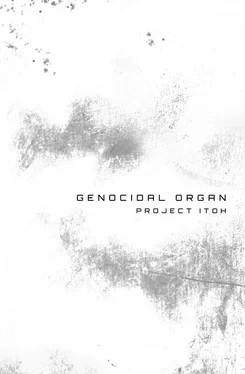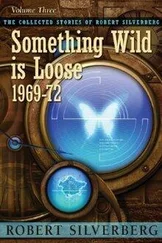Project Itoh - Genocidal Organ
Здесь есть возможность читать онлайн «Project Itoh - Genocidal Organ» весь текст электронной книги совершенно бесплатно (целиком полную версию без сокращений). В некоторых случаях можно слушать аудио, скачать через торрент в формате fb2 и присутствует краткое содержание. Год выпуска: 2012, ISBN: 2012, Издательство: Haikasoru/VIZ Media, Жанр: Старинная литература, на английском языке. Описание произведения, (предисловие) а так же отзывы посетителей доступны на портале библиотеки ЛибКат.
- Название:Genocidal Organ
- Автор:
- Издательство:Haikasoru/VIZ Media
- Жанр:
- Год:2012
- ISBN:9781421550886
- Рейтинг книги:4 / 5. Голосов: 1
-
Избранное:Добавить в избранное
- Отзывы:
-
Ваша оценка:
- 80
- 1
- 2
- 3
- 4
- 5
Genocidal Organ: краткое содержание, описание и аннотация
Предлагаем к чтению аннотацию, описание, краткое содержание или предисловие (зависит от того, что написал сам автор книги «Genocidal Organ»). Если вы не нашли необходимую информацию о книге — напишите в комментариях, мы постараемся отыскать её.
Genocidal Organ — читать онлайн бесплатно полную книгу (весь текст) целиком
Ниже представлен текст книги, разбитый по страницам. Система сохранения места последней прочитанной страницы, позволяет с удобством читать онлайн бесплатно книгу «Genocidal Organ», без необходимости каждый раз заново искать на чём Вы остановились. Поставьте закладку, и сможете в любой момент перейти на страницу, на которой закончили чтение.
Интервал:
Закладка:
Whether he was hired for his White House and National Military Establishment connections from his MIT days or just for his phenomenal linguistic ability—he was apparently able to speak thirteen languages fluently—John Paul’s role was to take care of business for the firm’s nation-state clients.
His role was to attend the important functions in Washington, meet the right bureaucrats and Congresspeople so that he could plant seeds of sympathy in receptive minds. On the client side, John Paul had to select and prep the government ministers who would go down the most easily with the Western media, and then, when they were ready, fly them over to the US to place them on the right news programs. He set up a press center to receive foreign correspondents in style, building up a picture of his client country as a place where business could be done and foreign visitors were welcome.
After his first success, it was a simple case of rinse and repeat, and before long John Paul had become the go-to man in the field. He had become an official aide to various ministers for public information, press, media, culture, and propaganda for numerous developing countries.
And then the atrocities began.
The countries John Paul had worked for found themselves plunged into civil war in quick succession. The only variable was who started the troubles—in one country it seemed to be armed insurgents, in another the regular army, and in yet another the ordinary townsfolk—but one way or another they all seemed to lead to genocide on a massive scale. Even so, John Paul was seen as a success by some segments of society, for he always appeared to be at least partially successful, particularly in initially winning the hearts and minds and sympathy of the American people to the plight of his latest client. America would then be the country’s savior and guiding light, right up until the moment that the rug was pulled from under them when the people of their nice new client state inconsiderately decided to start killing each other. America had assumed the role of the shepherd toward a new democratic and civilized era for its adopted states, so Americans were understandably a little shocked when they found out that they seemed to be driving their little flocks into vicious civil wars.
It was as if the US had become an assassin of emergent developing countries. Initially though, no one would have dreamed of pinning the blame on John Paul. Why would they? How was anyone to suspect that this single, mild-mannered company man was capable of fooling all his bosses and colleagues and, unbeknownst to any of them, was coordinating a deliberate campaign to incite civil war and mass murder?
It was only when the evidence became too strong—when every single one of his clients ended up in some sort of horrific internal conflict—that people started looking at the possibility of a causal and not just a correlative relationship between John Paul and the atrocities emerging worldwide. Even then, John Paul was able to stick around at the company for a little while longer, as he paid no attention to his detractors. He was never worried about his company’s approval, after all. He didn’t need to play the game because he had no true interest in working there. He had only joined the company in the first place as a means of getting the genocidal ball rolling.
Eventually though, enough was enough, and John Paul was forced to leave the PR company. And then he seemed to disappear off the face of the earth. No trace of him in any country’s transport systems, no sign of him even buying food, anywhere, ever. Indeed, the last confirmed sighting was in a Prague shopping mall.
And here we were now, trying to track down the man who disappeared off the radar only a few days ago.
Since John Paul’s departure from the PR company he had only been visible through his works. His signatures on military orders. Whenever we heard John Paul was at the heart of another bloody civil war, we’d fly there to find he was already gone. Whenever we heard that he was orchestrating another massacre, we’d fly straight out there to find, yet again, that he had long since left. The greenhorn from the CIA must have seen his face at least one time, or else how else would he have kept tabs on him? And yet, according to his ID, John Paul had never been anywhere near the city …
It was then I realized that we were chasing a ghost. A specter born of the death and destruction of the Sarajevo Crater.
Waiting for Godot , huh? Maybe Williams’s analogy wasn’t such a stupid one after all.

1
The storm had passed, and Prague was calm.
There were gaps in the stone paving where the insurgents had salvaged rocks and hurled them at the police. Underneath the old paving there was synthetic flesh: exposed, red-raw, veins throbbing in a lattice.
I wandered through the deserted streets in a daze. The nanolayer ads that had once coated the historical buildings had been ripped off by the mob and burnt. Plumes of black smoke still emanated from all corners of the city, even though the insurgents that had caused the fires had long since melted away. Just like that pied piper who had disappeared from Hamelin without a trace.
The blood-red flesh of the streets gave the cityscape some blotches of color. I stepped onto it—it was hard, but elastic enough that it felt like I really was on top of a living organism.
I headed for the outskirts of the town, careful not to trip on the stone paving that now stood a couple of inches above the flesh. I felt like the only person left in the entire city after the riots. I was the last bastion of civilization. Maybe even the last person still alive in Europe.
I reached the outskirts of Prague and was confronted with fields of scarlet meadows, as far as the eye could see.
“What’s the matter, O son of mine?”
A sound from above. I looked up to find a giant object looming over the fields. The wing of a jumbo jet. Its white coating had peeled off and fallen to the earth, where it had formed a giant tower. I looked back at the wing: where there had been the white protective coating, there was now more exposed red flesh.
“Here! Over here!”
I turned to face the voice. It was my mother, although I couldn’t make her out at first, as her skin had been flayed just like the jumbo jet’s, and she too was a mass of exposed crimson.
It was then that I realized that the red fields that stretched out to the horizon were dotted with Intruder Pods. I hadn’t noticed earlier because these, too, were stripped bare, their black Stealth Coating removed to reveal the red muscle and blood beneath. Sinewy threads were dangling off them, fluttering in the breeze: blood-red seaweed floating in a blood-red ocean.
“Mom, you know you’re kind of … exposed?”
“Uh-huh. Atomic bomb, you know?”
“But Mom, you died back in Washington! I was the one who killed you!”
“Now who’s getting all melodramatic, O son of mine? It was the car that killed me, really, and the doctors who ended it all. You’re not to blame.”
“But I could have chosen to keep you on that machine. You’d still be alive …”
“Huh! Call that living, being plugged into that machine like a vegetable? You must be joking.”
“But your heart … your heart was still beating,” I said, on the verge of tears. “Call me old-fashioned, but as long as your heart and other vital organs are still working, you’re alive.”
“Okay. Mr. Old-Fashioned. You’re so twentieth century.” Mom gave a wan smile. Looking at her now was a glimpse into the inner workings of the human musculature—I could see clearly which muscles were at play in constructing her facial expressions. “But come clean, O son of mine—it’s not really the boundary between life and death that’s troubling you right now, is it?”
Читать дальшеИнтервал:
Закладка:
Похожие книги на «Genocidal Organ»
Представляем Вашему вниманию похожие книги на «Genocidal Organ» списком для выбора. Мы отобрали схожую по названию и смыслу литературу в надежде предоставить читателям больше вариантов отыскать новые, интересные, ещё непрочитанные произведения.
Обсуждение, отзывы о книге «Genocidal Organ» и просто собственные мнения читателей. Оставьте ваши комментарии, напишите, что Вы думаете о произведении, его смысле или главных героях. Укажите что конкретно понравилось, а что нет, и почему Вы так считаете.












